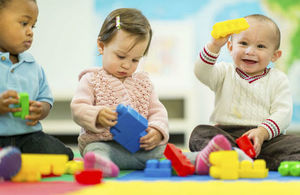More children than ever starting school ready to learn
New figures show record high in number of young children starting school ready to learn.

under 5s playing
New figures published today (13 October 2015) reveal more 5-year-olds than ever before are achieving the expected standards in maths and literacy - meaning more children are on the path to success during their first year of school.
Statistics show that more than two-thirds of children aged 5 are making good progress against the early years foundation stage profile - a framework for the early years (under 5s) which ensures all children are prepared and ready for school and life.
As a result of this government’s commitment to higher standards in every setting, today’s figures show that an extra 38,600 number of 5-year-olds are reaching the expected level of development in maths and literacy, as well as in prime areas of personal, social and emotional development, physical development and communication and language.
This means they can count to 20, describe weight and shapes in everyday language, write their own name and read simple sentences, as well as play confidently with their friends - skills which are vital to fulfilling their potential.
Education and Childcare Minister, Sam Gyimah, said:
We know that the first few years of a child’s life are vital in terms of how well they go on to do at school and beyond.
It is great news that more children than ever before are achieving the expected level of development in the early years, because parents should be confident that while their children are out of their care, they’re not only happy and having fun, but at the same time developing important skills - building confidence with numbers and letters - to ensure they fulfil their potential.
In 2012, the government introduced a more rigorous early years foundation stage profile which reduced red tape to enable professionals and parents to work together on the key areas of learning that are most essential for children’s readiness for future learning and healthy development
The early years foundation stage profile figures also show:
- 70% of children achieved at least the expected level in all early learning goals in literacy and 75% in maths
- girls continue to outperform boys in all early learning goals, with 74.3% of girls achieving the expected level of development compared with 58.6% of boys
- the attainment gap between the lowest attaining children and their classmates continues to decrease to 32.1%
This government is committed to raising the bar and improving the care children receive. That is why we have introduced a number of initiatives to ensure that those who care for our children have extra support to help. These include:
- introducing the early years pupil premium - giving providers additional funding to provide specialist high-quality support for some of the most disadvantaged children
- ensuring all early years teachers must now meet rigorous new standards and pass the same skills tests as trainee school teachers
- changing the rules so that all early years educators, who are responsible for leading nurseries and educating and caring for young children will be required to have at least a C in GCSE English and maths which they can work towards whilst in training
Notes to editor
- The actual increase was 46,800, but there were more children in 2015 than in the previous years. The equivalent increase of 38,600 is based on applying the 2014 percent achieving a good level of development to the number of children in 2015.
- The new early years foundation stage profile was introduced in September 2012 and is completed by teachers for all children in the summer term of their reception year at school. There is no test - assessment is based on teacher observations throughout the year. Teachers make a best-fit assessment of whether children are emerging, expected or exceeded against 17 early learning goals. Children are deemed to have a good level of development in the new profile if they achieve the expected level in the prime areas of personal, social and emotional development, physical development and communication and language, and the specific areas of and literacy and mathematics.
- Read the ‘Early years foundation stage profile results: 2014 to 2015’ figures.
DfE media enquiries
Central newsdesk - for journalists 020 7783 8300